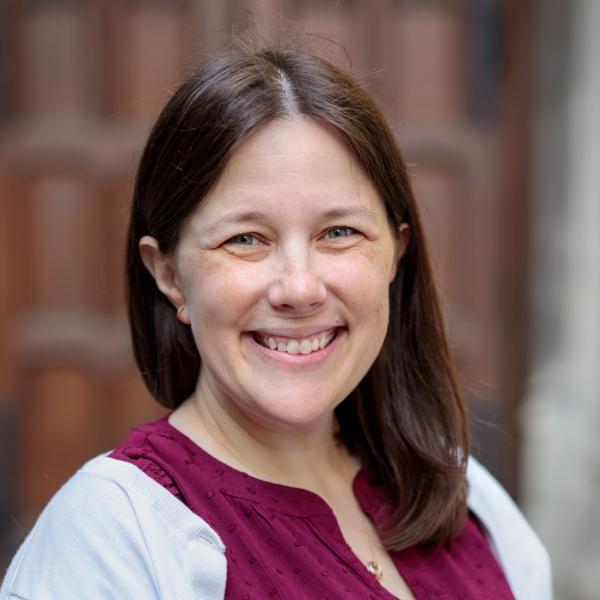
Dr. Melissa Baese-Berk studies the way we understand, produce, and learn spoken language, with an emphasis on second-language acquisition. She uses experimental and corpus-based methods to investigate how speakers and listeners produce and perceive language and how various cognitive, linguistic, and social factors impact these abilities. Some current projects examine communication between health-care providers and aging patients, the relationship between perception and production among learners of second languages, and a collaborative project examining what neural activity in mice during perception can tell us about how humans perceive speech. Her work is funded by the National Science Foundation and the James S. McDonnell Foundation.
Recent Publications
Baese-Berk, M. M., Kapnoula, E. C., & Samuel, A. G. (in press). The relationship of speech perception and speech production: It’s complicated. Psychonomic Bulletin & Review.
Holt, Y. F., Bent, T., Baese-Berk, M. M., & Rothermich, K. (in press). Southern regional dialect variation and race identification in American English. Journal of Speech Language and Hearing Research.
Daniels, D., Haupt, Z., & Baese-Berk, M. M. (2024). The phonetics of vowel intrusion in Sgi Bara. Journal of Phonetics, 104, 1-12.
Harel, D., Goudelias, D., Cheng, H-S., Baese-Berk, M. M., Theodore, R. M & Levi, S. V. (2024). Examining the relationship between multiple tests of receptive vocabulary. Journal of Speech, Language, and Hearing Research, 67(2), 595-605.
Houghton, Z., Kato, M., Baese-Berk, M. M., & Vaughn, C. (2024). Task dependent consequences of disfluency on the perception of native and non-native speech. Applied Psycholinguistics, 45(1), 64-80.
Kato, M. and Baese-Berk, M. M. (2024) The effects of acoustic and semantic enhancements on perception of native and non-native speech. Language and Speech, 67(1), 40-71.
McLaughlin, D. J., Baese-Berk, M. M., & Van Engen, K. J. (2024). Daily exposure to unfamiliar accent improves listening performance but may not reduce listening effort. Frontiers in Language Sciences: Bilingualism, 3(124368), 1-12.
Mohn, J., Jaramillo, S., & Baese-Berk, M. M. (2024). Selectivity to acoustic features of human speech in the auditory cortex of the mouse. Hearing Research, 441, 108920.
Schmid, C., Haziq, M., Baese-Berk, M. M., Murray, J. M., & Jaramillo, S. (2024). Passive exposure to task-relevant stimuli enhances categorization learning. eLife. 12: RP88406
Afghani, C., Baese-Berk, M. M. and Waddell, G. (2023). Performance pay and non-native-language comprehension: Can we learn to communicate better when we’re paid to listen? Applied Psycholinguistics, 44(SI4), 593-609.
Alderete, J., Baese-Berk, M. M., Brasoveanu, A., & Law, J. H. K. (2023). A new corpus of lexical substitution and word blend errors: Probing the semantic structure of lemma access failures. Journal of Cognition, 6(1): 26, 1-8.
Baese-Berk, M. M., Levi, S. V. & Van Engen, K. J. (2023) Intelligibility as a measure of speech perception: Current approaches, challenges and recommendations. Journal of the Acoustical Society of America, 153(1), 68-76.
Baese-Berk, M. M. and Reed, P. E. (2023) Addressing diversity in speech science courses. Journal of the Acoustical Society of America, 154(2), 918-925. [Selected as cover article for the issue of the journal]
Coretta, S. et al. [157 authors, including Baese-Berk, M. M. and 4 graduate student authors and 1 undergraduate student author from SPPLab] (2023). Multidimensional signals and analytic flexibility: Estimating degrees of freedom in human speech analyses. Advances in Methods and Practices in Psychological Science, 6(3) 1-29.
Nagle, C., Baese-Berk, M. M., Diantoro, C. & Kim, H. (2023) How good does this sound: Examining listener’s second language proficiency and their perception of category goodness in their native language. Languages, 8(1), 43.
Weissler, R. E., Drake, S., Kampf, K., Diantoro, C., Foster, K., Kirkpatrick, A., Preligera, I., Wesson, O., Wood, A., and Baese-Berk, M. M. (2023) Examining linguistic and experimenter bias through “non-native” and “native” speech. Applied Psycholinguistics, 44(SI4), 460-474.
